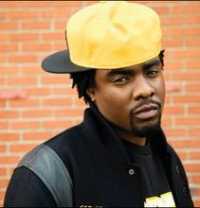WALE
For years, hip-hop's epicenter had long been its birthplace: New York City. The five boroughs churned out dozens of the game's most influential, street-savvy rappers. Los Angeles took its turn in the spotlight, contrasting laid-back grooves against visceral, eviscerating gangland lyrics. Most recently, it's been Atlanta's time to shine, riding reams of popped-collar party anthems and unapologetic theatrics. Ironically, the nation's capital –rife with social and racial tension and inequality—has never boasted an apt mouthpiece. In most urban landscapes, the dominant musical sound is hip hop, but in the mid-Atlantic region, what should be a fertile breeding ground for hip-hop, go-go music reigns supreme. But all that's changed with the arrival of Wale.
Wale is a 24-year old rapper who rides for the "DMV" – DC, Maryland and Virginia – and who in turn enjoys support from the likes of Jay-Z, Mark Ronson, Pharrell, The Roots, Bun B, and The Clipse. The son of Nigerian immigrants, Wale cut his teeth in the unforgiving Northwest district of DC. Desperate to find quieter environs, Wale's parents moved to the Maryland suburbs when he was a teen. But the changes didn't stop there; in all, Wale spent time in seven different high schools scattered about the DC/Maryland area. "I kind of understand the plight of all people, from understanding all those different environments," he says. "My first high school was a predominantly black school, then I went to a predominantly white school, and then back again. I think that helped me cultivate an open mind about most things in life."
Wale parlayed his watchful gaze into an open musical ear: "When I was growing up, DC didn't have allegiances to any one area," Wale says. "So people listened to everyone: Scarface, Biggie, 2Pac, Outkast, UGK and Snoop. No one felt like they had to listen to artists just from New York or Atlanta. We took it ALL in." Of course, Wale was innately influenced as much by DC's output as his own subjective input. "You can't live in this area and do music and NOT be influenced by go-go on some level. It's just what we do here," he affirms. "I'm very open-minded about music. But when you're young and coming up, it's hard to be sure that you're doing the right thing. So I can understand why you don't see a lot of people taking risks."
Earning football scholarships to Robert Morris College and later Virginia State University, the multi-talented Wale made a go of higher education. But he knew where his heart lay; performing for, and ultimately winning over, increasingly larger audiences. Wale was likewise bolstered by reports of his provincial records getting spins elsewhere, e.g. North Carolina and even ATL. Riding the regional groundswell, he dropped out of school in 2004 to pursue music fulltime.
Wale's viral contagiousness spread beyond the DMV with a series of mixtapes released in the last three years– including his two most recent, Mixtape About Nothing (2008) and 100 Miles and Running (2007). He also appeared on The Roots' single "Rising Up" from their Rising Down album, and a remix of Lily Allen's bubbly pop record, "Smile," which reverberated through the blogosphere and international venues. That remix was the brainchild of producer and artist Mark Ronson, who's responsible for the new pop/soul sound of luminaries like Amy Winehouse. Ronson was so taken with Wale's posture – part street-reared ruggedness, part introspect and wit – that he signed him to his label, Allido Records, and later to a joint venture with Interscope, through which Wale's debut album drops in 2009.
“Mark Ronson is a music junkie and he stumbled across one of my records, which he thought was really hot, so he reached out," Wale remembers, referencing his 2007 independent record, "Good Girls." "I came to his studio and we went to work. He brought me on tour and really felt what I was doing."
"He's the exact opposite of 'narrow-minded'," Wale continues of Ronson. In Wale, Ronson saw an artist after his own heart: unaffected by the hot sound of the moment, and unafraid to tackle tracks from different genres. Note the aforementioned "Smile," or his work with French electro-house stars Justice, turning their "D.A.N.C.E." record into a hip-hop banger (renamed "W.A.L.E.D.A.N.C.E." on 100 Miles and Running). But lest you test his swagger, he scathes the vocal booth with Bun B and Pusha T of The Clipse on "Back in the Go-Go," from Nothing. His newest single "Nike Boots," and its remix featuring Lil' Wayne, continues the trail of seared cement in his wake. Most recently he released the debut video for "Nike Boots," which was filmed in DC and helmed by acclaimed director Chris Robinson. Most recently he performed alongside both Ronson and a live go-go band at NYC's Highline Ballroom.
Having met every challenge, and exceeded every expectation, Wale is poised as hip-hop's next innovator. He's already amassed much early press (Rolling Stone, Entertainment Weekly, The Fader, MTV, allhiphop.com, VIBE and covers of XXL, URB and DNR). His recent mixtapes, produced by Nick Catchdubs, have earned heaps of praise. And his peers echo the plaudits: "Jay-Z told me, 'If it feels right, do it. Don't go by demographics,' reports Wale. "I reassured him, saying 'I never do anything by demographics.' I guess it's just my upbringing." The world can thank that very upbringing for the wunderkind that is Wale.
